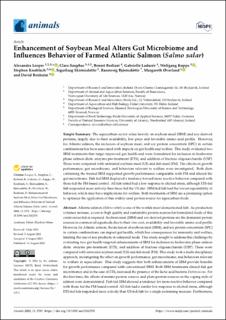| dc.description.abstract | Atlantic salmon (Salmo salar) is one of the worlds most domesticated fish. As production volumes increase, access to high quality and sustainable protein sources for formulated feeds of this carnivorous fish is required. Soybean meal (SBM) and soy-derived proteins are the dominant protein sources in commercial aquafeeds due to their low-cost, availability and favorable amino acid profile. However, for Atlantic salmon, the inclusion of soybean meal (SBM), and soy protein concentrate (SPC) in certain combinations can impact gut health, which has consequences for immunity and welfare, limiting the use of soy products in salmonid feeds. This study sought to address this challenge by evaluating two gut health-targeted enhancements of SBM for inclusion in freshwater phase salmon diets: enzyme pre-treatment (ETS), and addition of fructose oligosaccharide (USP). These were compared with untreated soybean meal (US) and fish meal (FM). This study took a multi-disciplinary approach, investigating the effect on growth performance, gut microbiome, and behaviors relevant to welfare in aquaculture. This study suggests that both enhancements of SBM provide benefits for growth performance compared with conventional SBM. Both SBM treatments altered fish gut microbiomes and in the case of ETS, increased the presence of the lactic acid bacteria Enterococcus. For the first time, the effects of marine protein sources and plant protein sources on the coping style of salmon were demonstrated. Fish fed SBM showed a tendency for more reactive behavior compared with those fed the FM-based control. All fish had a similar low response to elicited stress, although ETS-fed fish responded more actively than US-fed fish for a single swimming measure. Furthermore, SBM-fed fish displayed lower repeatability of behavior, which may indicate diminished welfare for intensively farmed fish. The implications of these findings for commercial salmonid aquaculture are discussed. | en_US |

